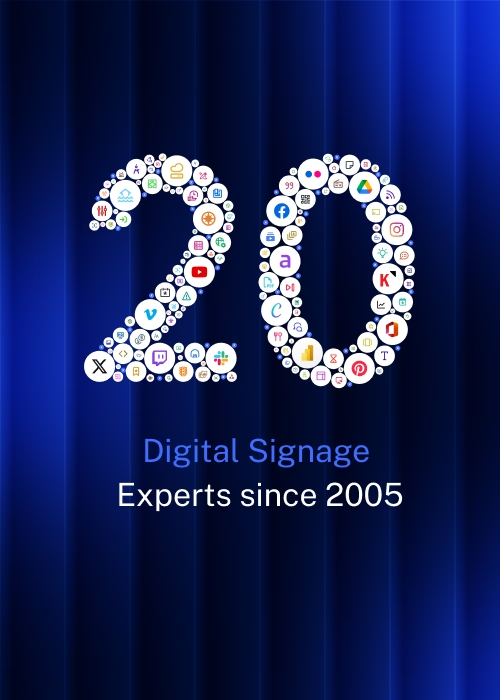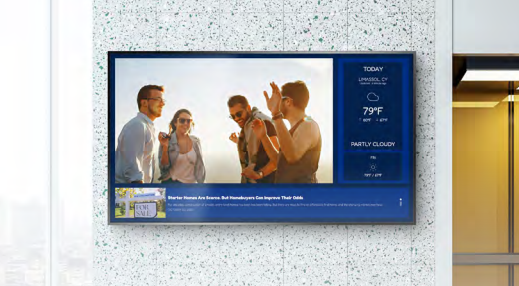What Is A Video Wall & How Does It Work? (& Installation Guide)
Video walls can be simple or complex depending on what you want to use them for. This article will define what a basic video wall is, the components you need to buy and tips for designing appropriate content.
What is a video wall? Our video wall definition
In short, a video wall is a collection of screens that are combined/tiled together to create one large display. Typical display technologies used include LCD, direct LED tiles, rear-projection and laser displays. The purpose for using video walls varies depending on the industry. Industries where video walls can be used include; corporates, hospitals, retailers, government offices, churches, schools, casinos and hotel receptions.

Most video wall installations are going to be LED for a few reasons:
- no seams on the wall
- high brightness
- flexibility in design e.g. curved screens for stone column
Because of their size and clarity, video walls have a WOW factor that makes them very effective for marketing messages and branding. It's important to note that the content displayed is key in reaching messaging goals for the video wall. And in order to optimize the content displayed, content management software is needed.
The software enables users to change the content, adjust the content layout, and update content schedules. It provides a richer set of control features including multi-user access and reporting.
That's what this article is about i.e. video walls with content management software. Surprisingly, only 13% of the video wall systems installed have content management software. Such projects run the risk of showing poor content, which makes the video wall a very expensive decoration.

How does a video wall work?
A video wall is a collection of displays aligned so content can be displayed over the displays continuously. Video walls works by using a specific type of hardware setup to display content without interruption. This also requires software to help plan and configure the content.
Benefits of a video wall
But why should you even use a video wall? Below are the top benefits of a video wall.
- Grabs attention
- Employee time
- Different types of content simultaneously
- Suitable for a wide range of industries
- Flexible installation
- Support content customization
- Increase sales
- Improve customer experience
- Consumers prefer them
1. Grabs attention
Because of their large size, video displays are able to command attention. They are hard to ignore by customers, employees, or visitors, which makes them an ideal tool for an organization’s branding or informational campaigns.
2. Employee Time
Video walls can help perform tasks an employee normally would. It can free up employee time so they can work on more pressing tasks. This is done by displaying important information that staff would typically have to answer: For instance:
- Large malls can display maps on video display
- Parks and stadiums can display frequently asked questions
- Hospitals can display services offered online
3. Different Types of Content Simultaneously
A video wall that is powered by content management software is designed to display different types of content simultaneously. For instance, a campus can use a video wall to display maps, school events, and useful information like weather, news and social media.

4. Suitable for a wide range of industries
Traditionally, video walls, especially LED ones, have been used in retail for advertising and at events. Costs were high and content management wasn't as evolved. Today, video walls are cheaper and more affordable for small and medium businesses. They are being installed in corporate offices, schools, government offices, hospitals, hotels, casinos and houses of worship. They are so diverse and thus are used across a large range of industries.
Check out our video wall examples post for some inspiration!
5. Installation is Flexible
LED video walls offer a lot of flexibility in design. For instance, they can be curved to fit around corners and columns. Additionally they can be shaped in architectural ways outside of the traditional rectangle or square install.
6. Support Content Customization
The content management software enables businesses to customize and personalize the content displayed on the screens.
Different content can be displayed at different times of the day e.g. a restaurant video wall can show different breakfast, lunch and dinner menus. The content also auto-updates e.g. when a calendar changes, the events listed on the video wall are updated.
7. Can Increase Sales
Retail businesses that use digital signage can improve their sales by 32%. Retailers can use a video display system to alert thousands of target customers about discounts and other great deals.

8. Can Improve the Customer Experience
An estimated wait time sign can combat customer dissatisfaction resulting from unpredictable waiting times. Leading service providers have been using this trick to keep clients waiting patiently. Thus, like those leading service providers, any business can use this system to improve their customer satisfaction scores.
9. Consumers prefer Shopping in stores with Video Displays
42% of consumers are likely to purchase from stores with video displays rather than those without. The video displays give customers more information about the products, help to upsell complementary products and overall improve the ambiance in the store.
Video wall system components
While the display is the most visible part of a video wall, it isn't the only element. Several other video wall system components collaborate to display those attention-grabbing images on display.

Some of the components are:
Hardware
The hardware refers to all physical components that make up the entire system. The most significant hardware are:
- Digital display
- Media player
Digital display refers to the screens. For instance to form one large display, screens can be tiled together. The screens can be LED or LCD. We recommend using commercial-grade screens with narrow bezels for seamless viewing and best content display.
LED screens have thinner bezels, the widest viewing angles, best picture quality, and more energy-efficient. They are however much more expensive than an LCD screen of the same size.
The media player is a device you connect to your screen. For example, the media player can be connected via an HDMI cable or VGA ports to the screen. It receives content from the software and displays it on the screen.
Software
Also known as the content management software (CMS), digital signage software is the central platform to allow users to manage their digital signage content.
Without going into too much detail, your software is the command center that lets you upload/create content and deploy it to your video wall. This is where you'll manage the content displayed and the hardware used.
Content
This is undoubtedly the most essential aspect of a success digital display. It's what the target viewers see and interact with. This content can be in the form of images, screenshots, videos, infographics, GIFs, memes, and presentations.
Designing your content
Video walls display information. Ideally, this would be to the right target audience at the correct time. Otherwise, this communication and advertisement channel will be less effective.

So how does one make sure that their video wall system plays its role effectively? Below are some video wall content design tips:
- Use high-quality realistic images/videos
- Like any visual, high-quality images and videos will easily command anyone's attention than poor quality visuals. Even so, one should refrain from using heavily filtered pictures or videos.
- Keep text short and to the point
- As a rule, any text on a display wall system should be as concise as possible. A single line should contain a maximum of 5 words. Anything above five words will look cluttered and harder to read. Also, texts should be large and colorful enough for anyone to read without straining.
- Use the right screen brightness
- Lighting affects the visibility of the content displayed on the video wall's digital screen. As an example, target viewers can hardly see content on a dim screen during a bright day. It's important to adjust the screen's brightness according to ambient light.
- Do not clutter the video wall
- While a single video wall system can display multiple types of content, it isn’t advisable to stuff it. A professionally designed video wall should contain an adequate white space to let readers view or read through the content easily and quickly.
- Test content often
- Testing content is the only way one can know if their content is appropriate, understandable, and actionable. Otherwise, your digital signage will not properly pass the desired message. To test your content, the content creator can run periodical surveys to gauge the content’s performance and impact. That way, content creators can discover and implement corrections to improve their ROI.
Video wall applications: what is a video wall used for?
Most savvy business owners first question when they see a video wall boils down to, "How can I use this technology?" The top video wall applications are:
- Banks
- Impress and improve your branding with video walls and digital signage for financial institutions.
- Corporate
- Make a great first impression to potential employees and important visitors with a video wall. Corporate digital signage ensures you can adapt and impress.
- Churches
- Digital signage for churches provides multiple benefits including increased recall rate and impact. Showcase church history or live speeches by church leaders.
- Education
- Both K-12 & Colleges can benefit from digital signage for education. Video walls at these institutions can showcase to potential students that your school is technologically savvy and ahead of the times.
- Entertainment
- Improve your advertising with entertainment digital signage. Because of their size, video walls automatically command attention. Use this to showcase upcoming events.
- Government
- A lot of agencies across the country are looking to adopt government digital signage. This can be used for important information or upcoming projects.
- Healthcare
- Healthcare digital signage is great for impressing and informing patients and visitors. Display new wings or department heads to let everyone know the professionalism they'll expect from your clinic or hospital.
- Hotels
- Hotels are adopting all types of technology including hotel digital signage. Improve your hotels branding and make a great first impression by showing amenities or local attractions.
- Manufacturing
- Digital signage for manufacturing offers two avenues of success; to employees and to visitors. Video walls can show project or team status to employees while also making a great addition to the lobby for potential clients or investors.
- Restaurants
- Digital menu boards for restaurants can be either single displays (popular for menus) or video walls. Video walls are perfect for entertainment and can show music videos, sports games, or television shows.
Video wall installation: How to make a video wall
By far the most difficult aspect of the process is the video wall installation. For those looking for how to make a video wall, we have a great mini-guide below.
Video walls are a set of screens that work together to create one continuous and impressive display. You may want a video wall to relay information, create an immersive display, interact with your audience, or for presentations. They are difficult to create for those that are unfamiliar with the process. However, following the tips in this guide should make it easier.
1. Have a Clear Vision
You need to create a draft project document that highlights its important points, goals, or objectives. Some points to consider include:
- The purpose of the video wall, what you plan to display
- Location: is it near WiFi, internet cable, electrical outlet, near a water fountain?
- Size: the size that would accomplish what you want to achieve
- Layout: for instance, in a 4 TV video wall project, do you want that in 4x1 or 2x2 video wall layout?
2. Measure Everything

If you decide on a DIY video wall, you are likely to mess up the measurements. Here’s what you should include:
- Display size: people only consider the screen size but overlook display size. Measure the bezels and width
- Clearance: the space behind the display and support structure
- Frames, supporting structure, walls
- Distances: to power supply, internet connections, between displays
- Space allowance: for media players, internet or WiFi adapters
- Weight: consider supporting structures, cables, video wall controller
3. Select Your Hardware
The most important digital signage hardware element is the video wall panels. If they are for digital signage, you want high-quality video wall displays like an LG or Samsung video wall. Using Samsung for illustrative purposes, a single display unit costs $2,000 to $6,000.
When choosing a video wall TV, remember that a thin bezel TV for video wall will look the best. They create an illusion of a seamless video wall, especially if you choose a multiple panel set-up, such as a 3x3 video wall. Another thing to consider is that LCDs are better at close-up viewing, and LEDs look better at further distances.
Video wall mounts come in various types; make sure you get the right one for your displays. For instance, the Peerless video wall mount can only accommodate 46’ to 55’ video wall TVs. A simple Peerless 2x2 mounting kit for 46’-55’ screens costs $534.
4. Consider Media Players
Digital signage media players allow you to control and show content on digital signage displays. Most media players come bundled with video wall software free of charge.
If you have a simple project such as a 2x2 video wall mount, a simple $350 Mvix Core media player will do. For a bigger set-up like a video wall grid, you need more computing power. A desktop computer that has several display ports will be more suitable as your video wall processor. Alternatively, you can go with video/matrix players or video wall controllers. They are devices that allow streaming of a single video source to multiple screens.
It would help if you had digital signage software or content management software (CMS) to control and display content on your video wall. Although some software is cloud-based, you can choose an onsite solution such as Mvix software.
5. Create a Plan
Video wall signage is not cheap. Create a detailed project draft that lists down all materials before you start. Let others run through the draft to ensure you cover everything, preventing oversight that could prove costly down the road.
You are likely to overlook some design features; why not create a wall schematic? The wall drawing will give you a rough idea of what the video wall will look like.
6. Construct Your Wall

A grid-style video wall is the most complicated set-up as it requires a lot of configuring and installation.
- Displays and mounting – match your screens to the right mounting and adjust according to the grid. Bigger set-ups will be bolted to the floor, smaller ones to the wall.
- Accessibility – If you decide on an LCD or DIY LED video wall, leave some space for installing cables and media players.
- Software installation – install and update the software and load it with content.
- Audio – connect the media player to external speakers. Be mindful of the speaker placement to improve acoustics.
7. Customize Your Displays
With your digital signage video wall up and running, you need to create customized content for display. Before you do so, you need to develop digital signage content through research, content creation, and distribution. Some innovative digital signage content ideas of:
- Live social media feeds
- FAQs
- Emergency, News, traffic, weather alerts
- Quizzes and games
- Motivational messages
Like any other electronic, you should regularly clean your video wall screens to get rid of dust and dirt. Ensure you update the software to keep it running smoothly. Support needs to check the displays to catch any degradation quickly and prevent downtime. Additionally, keep the video wall display off for at least two hours daily.
You need to keep your content fresh and interesting through updates. Fortunately, there are plenty of digital signage apps that simplify creating and updating rich content.
Worth the Investment?
Are video walls worth the investment? The short answer is yes. When used, this technology can increase an organization’s brand identity and streamline visitor experience. A video wall system can foster good first impressions, support self-service, and free up employees. When video display signage are designed professionally, they tend to deliver the best benefits. Unlike amateurs, professionals will align the system for enhanced visibility, and set up the system appropriately. With an expert’s input, a video wall will not disappoint.







